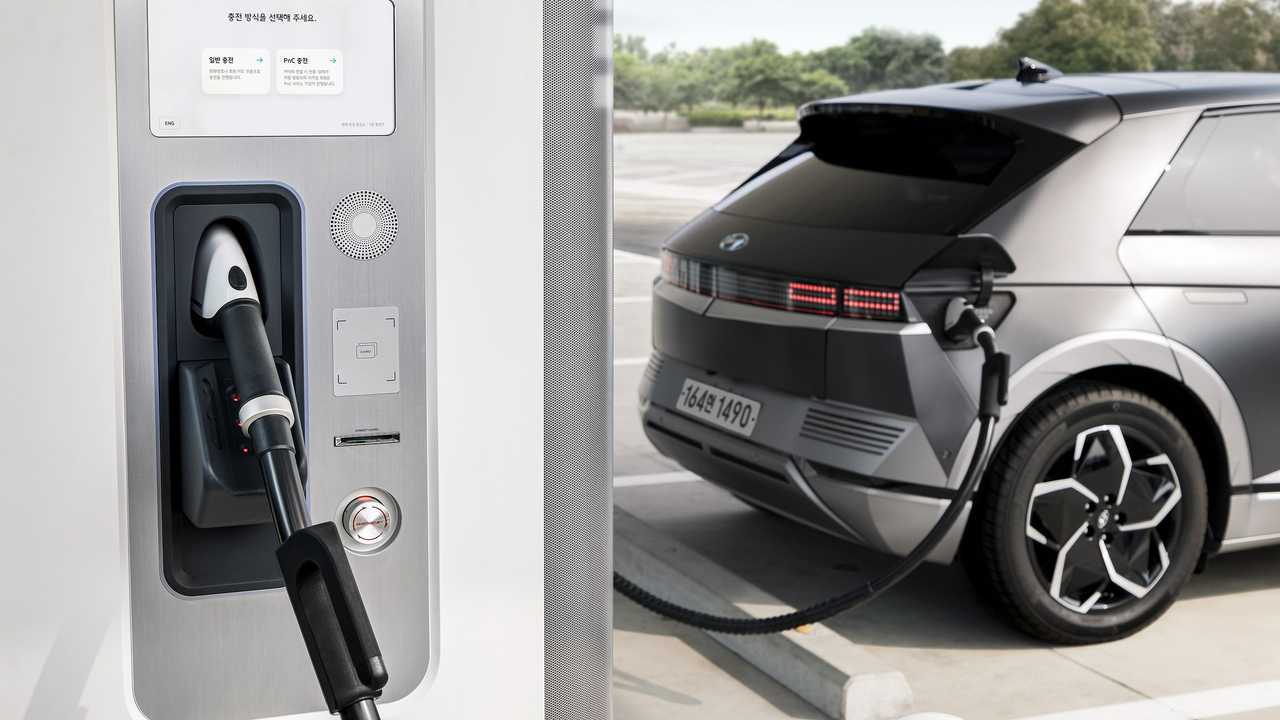Hyundai Motor will consider the switch from the Combined Charging System (CCS1) to the Tesla's North American Charging Standard (NACS) charging connector in North America.
According to Reuters, the company's CEO and president Jaehoon Chang said that the shift will be considered, noting at the same that the best interest of its customers must be secured.
"...the company would consider joining the alliance of automakers shifting to Tesla's standard, but that it would have to determine that was in the interest of its customers."
One might ask what is the customer's best interest regarding charging? Well, there is an issue with the voltage. Currently, Hyundai Motor Group's (Hyundai, Kia, and Genesis) latest all-electric cars are based on the E-GMP platform, which has high-voltage battery systems (around 600 to around 800 volts). Higher voltage allows fast charging at a proportionally lower current (when the same power level is considered).
For the South Korean manufacturer, it's then very important to make sure that the NACS standard will support higher voltage than currently used by Tesla (around 400 V). The second thing is whether the Tesla Supercharging network will be equipped with high-voltage chargers to maximize the fast charging speed (and efficiency) of cars like the Hyundai Ioniq 5 or Kia EV6.
It seems that Hyundai's boss is open to the idea and hints at possible talks with Tesla about the topic:
""That's what we will look into from the customer's perspective," Chang told analysts at the automaker's investor day."
"Chang said Hyundai would consult with Tesla to see whether it could make adjustments to its charging system for Hyundai customers so they could charge faster."
We can't say anything for sure, but it seems that if issues are solved, then the company is willing to make the switch to the NACS.
Let's recall that when Tesla announced the opening of its proprietary charging connector in November, it revealed that there are two configurations 500 V (currently used by Tesla) and 1,000 V. The second one should easily handle all vehicles with higher voltage battery systems, like 600-800 V in the E-GMP or even 900 V in Lucid models.
The power output is also promised to reach the one-megawatt level, far exceeding the current power needs of electric cars, which is quite amazing compared to the compact size of the connector.
In other words, if Tesla will launch the 1,000 V configuration of inlets, plugs, and other elements (and open the full documentation, so other OEMs can produce those parts independently from Tesla), then Hyundai Motor Group would be far more interested in joining the NACS coalition.
It's worth noting that the NACS coalition in North America already includes Ford and General Motors and those manufacturers are also interested in the 800 V battery systems. GM's Ultium platform is already running on 800 V, so there is a big chance that Tesla already outlined the path to a higher voltage in internal talks with other manufacturers to convince them to switch.
We are pretty sure that if the voltage is the issue, there is no issue at all because even Tesla is expected to adopt higher voltage systems.

Hyundai Electric-Global Modular Platform (E-GMP)
The case with Hyundai Motor Group is bigger than just charging standard for cars sold in North America.
If a South Korean major automotive company switches to NACS in North America, then what would be the point of sticking with the CCS1 in South Korea? In a few years, it would become a rare market for the CCS1/J1772 (considering the size of the market). South Korea has no real interest to have a rare charging standard just for itself (assuming that CCS1 will be orphaned in North America).
In other words, the decision behind the switch to NACS will be more political because it will likely include not only Hyundai Motor Group (its local sales in South Korea) but the whole country (including its infrastructure and other manufacturers operating in South Korea).
There is a big decision on the table then, but not the first of such kind. In the early days, when Japan pushed with EVs (Nissan and Mitsubishi) and its CHAdeMO fast charging standard, South Korea was following ChadeMO for quite some time before switching to the CCS1 around 2018, if we remember right.
Source: Reuters

